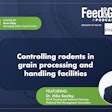Eleven years ago in our Manager’s Notebook column, we first examined the generational diversity of the workplace and the topic of working with multiple generations of colleagues in the feed and grain business (Manager’s Notebook, August/September 2005). A lot has changed during the past 11 years. We have grown older, and the students we most frequently work with, who are still traditionally 18 to 22 years of age, seem in many respects less like us than previous groups of students. We suppose every generation might say this, but there are likely several characteristics of our coming-of-age college students and your most recent and soon-to-be future hires that are interesting and important for your feed and grain business. In this issue’s column, we take a look at the youngest generation in our society. We discuss some of the preferences and characteristics of this group and provide ideas and approaches for engaging this group of employees to positively contribute to your business.
The iGen Generation
You have probably heard the generational labels of Veterans, Baby Boomers and Generation X. We discussed those in our previous column, so will not focus on these this time. The generation after Generation X has been referred to by many names: Generation Y, the Millennials, the Me Generation. There is also debate on the birth years of this generation, but they were born from approximately 1980 to the present. However, some suggest breaking this lengthy time period into two parts: 1980-1994 (the Millennials) and 1995-2012 or even up to the present (the iGens) — because those born at the beginning of the time period and those born at the end of the lengthy time period truly were born into different technological and cultural realms. A person born in 1980 is likely to relate a bit more with Generation X while someone born in 1995 (age 21 today) will not remember a time without a home computer, cable television, cell phone or reality T.V.
Dr. Jean Twenge, professor of psychology at San Diego State University and author of the book Generation Me, has extensively studied the youngest generational groups. She has collected substantial data on multiple generations and finds that our most recent group of students and your youngest employees are more different in their self-esteem, high expectations, and their level of narcissism than previous generations. They have strong self-esteem possibly because they have often been told “they are special.” From her research findings, Twenge suggests our youngest generation emphasizes the self more and emphasizes social rules less. Many have pointed out this generation is the one which has received the many participation trophies and has been raised to hear that “everyone is a winner.” They also have been found to be more narcissistic (having an undue fascination with oneself) than previous generations. Because they have high expectations for their careers and life, they can be unsettled when their expectations are not met.
Our youngest generation also has differences in media use, screen time (includes all types of “screens”: computer, smartphone and/or tablet), independence, and social rules than older generations. They are very savvy with the Internet, Facebook, Twitter, and they are always connected with friends of their age. Screen time is high, and social media and texting are their main avenues of communication. Twenge found that approximately 53 hours per week on average is spent by this group with texting, videos, and online use and media; while less than 20% read a book or magazine each day. This group is very connected with their parents, in part due to technology and in part due to their parents’ constant interaction with them. You may have noticed these characteristics yourself. These changes require us as professors and you as managers to reach for different tools and strategies in our jobs and roles.
As professors, we have been working with college students for multiple decades now. When we each started, our students were actually from the same generation as we were. So, we started teaching others who were, for all intents and purposes, much like us in experience, belief, culture, etc. Now, we have students much younger than us who have grown up under different circumstances. You too may see this yourself as you hire and manage new personnel. Some of our own observations of our students include a larger percentage of them wanting more input and more feedback than previous students; a larger percentage of them want complete examples and very direct and detailed instructions for project and paper assignments. A smaller percentage of students visit our offices to ask questions and get assistance; even fewer make phone calls; the largest percentage seem to prefer email as the primary form of communication with us. Emails are often very informally written — written like a text (“u” for you, “thks” for thanks, etc.) and typically with spelling and grammatical errors. Those in our freshman courses are even more engaged in their technology than those in our senior level courses. This could be partially due to lack of college experience and training and an understanding of classroom expectations. Many are uncertain how to take notes and what studying really means. Many seek significant input from their parents and communicate with them frequently, these communications made easy to accomplish via cell phones and text messages. One of us had an advisee bring a lengthy texted list of curriculum and course questions from his mom to his advising appointment with us. A larger percentage choose organized campus housing for multiple years over independent off-campus housing — indicating it seems easier and has less responsibility. Many do not like repetition of activities, feeling that if they have done something once, then that should be sufficient. This group challenges doing something only for the reason that an authority has instructed (possibly without a lengthy explanation) that it be done; it is crucial that they be provided the information on why it is important to do a homework or paper, etc.
Is any or all of this bad? Maybe or maybe not. It is different, and sometimes “change” and “different” are interpreted as bad rather than as just “different.” Greek philosopher Heraclitus said, “The only thing that is constant is change.” All managers, regardless of which generation they belong to, are faced with the constant of change. It is how you choose to approach change that impacts your outcomes and success.
The Millennials are now the largest generation since the Baby Boomers, and they are now the focus of the workforce. They are being followed by the iGen generation, which is even more different. We have found ways to adjust our classrooms and advising to improve engagement and results with our youngest generation of students. In the next section, we provide some approaches to help you use this information to achieve your goals as a feed and grain manager.
Implications for the business
Having grown up with the Internet and social media, the Millennials and iGens are used to instantly and nearly always knowing current information and results and always having some type of interaction. They bring this expectation with them to the classroom and workplace. They prefer frequent and immediate feedback and like interaction with others. You can help manage these expectations by making sure you clearly indicate how often feedback will be given. You may need to adjust and provide feedback more frequently than you are used to doing or have in the past. You may need to be more clear and direct with your feedback and directly link it to results and the importance to the business of the outcome.
Purpose and meaning, and outcomes and results are important to Millennials and iGens, but they may not always decipher the meaning on their own, so it can make for a better situation if you are direct with it. This may seem like more work to you, but remember you are the manager. What are your goals in this situation? … To effectively manage your personnel and the business, to be productive, to be successful, to retain good employees.
You may want to assign an employee mentor to Millennials and iGens. This may not work in all situations, but it is valued by this generation. Recall, they like feedback and interaction, and a mentor can help provide both of these. They also like opportunities for growth, and a good mentor can be viewed as assisting with these also. Because they like to work collaboratively, opportunities to work in groups and with others are helpful. Again, we understand that some positions do not lend themselves to this while others involve collaboration much of the time.
Another impact of the Internet, cell phones and videos games is shortened attention spans and being used to a lot of “action.” This impacts the effective presentation, use, and assimilation of materials like textbooks, readings and lectures for us in university settings and manuals and trainings for you in the business environment. Materials are most effective when shorter and more interactive than in the past. Short videos and embedded activities are helpful in providing engagement and changing focus.
Since this generation does seem to be a bit more focused on the self, the frequent use of the word “you” in materials helps them relate the work or concept to themselves and to important outcomes. This group also has a need and desire to understand why something (whatever it is) matters, and they want to know why it is worth their time. It is not enough to tell them to do something; it is important to relate the activity to an outcome and explain how this helps the business and how it helps them reach their own personal goals. They need to know the relevance because when the relevance is not clear to them, they are often not interested in it. Because they are used to finding and learning information immediately on the Internet, they often look to learn something just at the point in time it is needed and may not pay attention sooner or work ahead. They want to succeed and so they appreciate an environment and feedback that makes it clear how job responsibilities help them succeed.
Millennials and iGens seem to like structure. Materials like a syllabus or assignment for us — but a position description or annual goals and expectations document for you in your feed and grain business — need structure and clear directions. Any policies or rules are best written so that you can refer to this written text if an exception is requested or if an expectation is not met. Written expectations, policies and rules are also good for personnel who are anxious because it gives them clear directions on expectations, rules, policies, etc. Provide specific requirements and examples. For us these might include grading policies, rounding policies, absence policies or makeup exam policies. For you, these could be work hour and dress code policies, sick leave, emergency absences, and performance goals and expectations. Just like we need to indicate the specifics to earn a particular course grade, you may need to indicate the specific outcomes required to earn an exemplary review as well as what will be considered a “does not meet expectations” review.
Millennials and iGens have received criticisms stating they are not hard working and they are not loyal. They are different than many in older generations in that they are very willing to change jobs; they are open to change, and when they feel their expectations are not being met, they are willing to pursue other employment. It has been said older generations can view Millennials and iGens as expecting promotions and recognitions too soon or too frequently. Recall, they are used to action and change, and have shortened attention spans.
When surveyed, they indicate they want to enjoy their jobs, and the work environment is important. Remember, they also want to have meaning and so they want their work to have meaning. They may not always understand why their job and its responsibilities are important to the business or why a process or requirement is important to the business. It is useful if you make it clear to them the importance of their work and the benefits to the business, and further how it helps them reach their goals and gain additional opportunities in the business.
Even with such important business activities as safety protocol, safety training, sales training, and customer service training and procedures, it can be necessary and beneficial to make sure younger workers are told the meaning and importance of these. Millennials and iGens have often been said to care a lot about social responsibility. They often want to work for companies they consider socially caring. You can make them aware of how your business cares by pointing out how you treat customers, how you support local activities like the 4-H fair or local youth sports or other ways in which your business “gives back.”
The Takeaway
Millennials and iGens are not only the future of the workforce, but they are also the present. Like all generations before them, they are not identical to those previous generations. They bring to the workplace change, new expectations and new ideas. They are very technologically savvy as well as bright and talented. They desire meaning, like new opportunities, and like working with others. As university professors, we like working with them — and know you will too!
Understanding these characteristics and using them to your business advantage will help you best engage and retain them, which in turn will help you achieve your own goals as a manager in your feed and grain business.


















